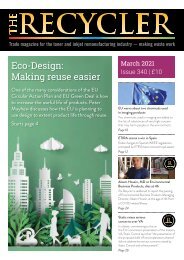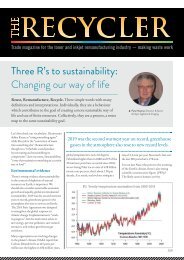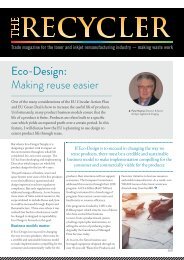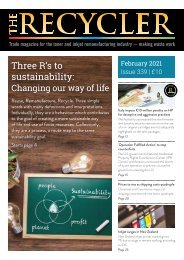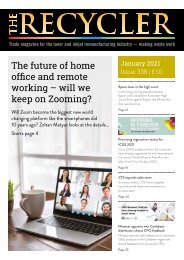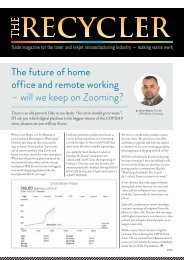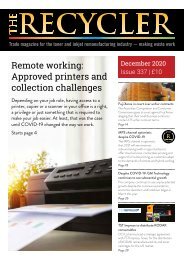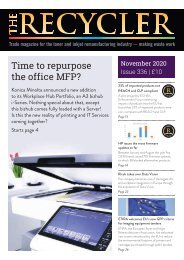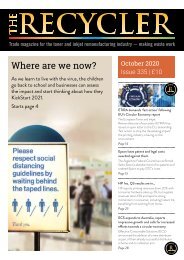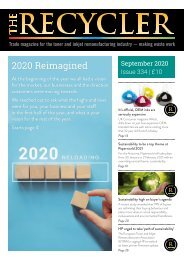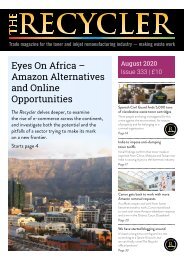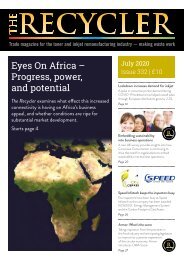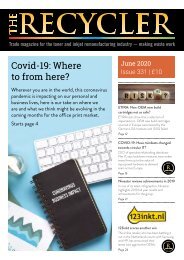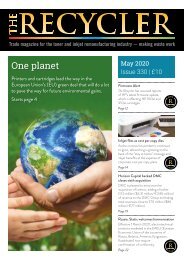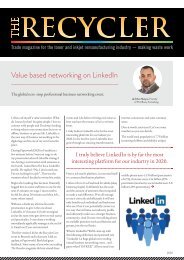The Recycler Issue 317
You also want an ePaper? Increase the reach of your titles
YUMPU automatically turns print PDFs into web optimized ePapers that Google loves.
FEATURE<br />
Business booming in Bucharest? continued<br />
Economic Forum, centred around Global<br />
Competitiveness, put Romania in the<br />
bottom ten out of 128 countries surveyed<br />
for their road infrastructure, and a better,<br />
but still unimpressive, 79th out of 138 for<br />
railways.<br />
Efforts were made to modernise the<br />
railways in recent years, with Toko’s<br />
Victor Matache telling <strong>The</strong> <strong>Recycler</strong> that<br />
between 2009 and 2012, “great progress<br />
was made in infrastructure development<br />
by allocating funds for investment, and<br />
spending these funds. Developing road<br />
infrastructure, promoting democratic<br />
reforms in the judiciary, modernising<br />
banking legislation, and supporting the<br />
free initiative has allowed a sustainable<br />
development of the private sector.”<br />
“<strong>The</strong> banking system has been<br />
strengthened, many production facilities<br />
and technical support have been set up by<br />
multinational companies and, last but<br />
not least, the private sector with<br />
Romanian capital has developed,”<br />
Matache reflected. “It was a period of<br />
sustainable economic growth.”<br />
However, since that golden, albeit<br />
short, epoch, the return to power of the<br />
Social Democratic Party (PSD), the<br />
successor to the former Communist Party,<br />
has resulted in “a period of investment<br />
stagnation and proliferation of<br />
corruption,” in which “the economy has<br />
stalled due to a lack of investment and<br />
misappropriation of public funds,”<br />
according to Matache.<br />
This ongoing corruption is a much<br />
more sinister problem for Romania than<br />
its creaking train tracks, with <strong>The</strong><br />
Guardian claiming it has “long been<br />
considered one of the most corrupt<br />
nations in the EU.”<br />
Two years ago, a government decree<br />
that was set to decriminalise low-level<br />
corruption provoked massive protests<br />
across the country, until it was ultimately<br />
cancelled in an emergency decision from<br />
the national court of appeal. Before this,<br />
tens of thousands had taken to the streets<br />
in condemnation of the Romanian<br />
government’s actions, which the<br />
influential Orthodox Church had said<br />
would allow corrupt politicians to escape<br />
punishment. In an ironic summary of the<br />
problem, the leader of the governing<br />
party, Liviu Dragnea, has been barred<br />
from becoming Prime Minister due to his<br />
previous convictions for vote-rigging.<br />
Such a flashpoint caused considerable<br />
distrust in the government, with<br />
President Klaus Iohannis saying at the<br />
time that his faith was in the protestors,<br />
not the ruling party, and calling for<br />
“European values” to prevail.<br />
Victor Matache blamed corruption in<br />
the country on “the effects of the long<br />
communist propaganda on the one hand,<br />
and the poorly understood freedom on<br />
the other hand,” offering a counterpoint<br />
to the beneficial Communist legacy of the<br />
country’s education system.<br />
“<strong>The</strong> most serious form of corruption is<br />
that of the political class, a phenomenon<br />
that manifests itself with all its adverse<br />
consequences,” Matache continued.<br />
“Many politicians have made their<br />
participation in the ‘political life of the<br />
country’ a profession to enrich<br />
themselves. Over the last thirty years, the<br />
evolution of the economy has been<br />
dictated by the interests of the political<br />
class in power.”<br />
2019 has brought a fresh set of<br />
challenges to the country, in the form of<br />
the increasingly-prevalent bank tax.<br />
Such a levy was first seen in Europe after<br />
its introduction in Hungary in 2010, and<br />
the idea has since caught on in Poland,<br />
Slovakia, and now, Romania.<br />
Applied properly, a tax on the assets of<br />
the banking sector could in some<br />
scenarios be justified, but in the case of<br />
that introduced by the ruling PSD, it has<br />
been described by Euromoney as<br />
“fundamentally inequitable and<br />
misconceived,” “unjust,” and “shortsighted<br />
to the point of stupidity.”<br />
<strong>The</strong> tax is being introduced as a way of<br />
controlling interest rates, which are kept<br />
artificially high, according to the<br />
country’s Finance Minister, Eugen<br />
Teodorovici, who has nicknamed it “a tax<br />
on greed.”<br />
But Euromoney’s Lucy Fitzgeorge-<br />
Parker attests that the inflation currently<br />
witnessed in the country is in actuality<br />
due to the PSD’s “increasingly freespending<br />
ways,” warning that in the last<br />
few years, the government’s “openhandedness”<br />
with pension increases,<br />
wage rises, and energy subsidies has put it<br />
“in danger of breaching the EU’s 3<br />
percent budget deficit cap this year.”<br />
In 2018, the Financial Times also<br />
linked Romania’s “record economic<br />
growth” with a worrying rise in inflation,<br />
as it reported that the central bank was<br />
raising interest rates by 0.25 percent, to 2<br />
percent, the first such rise in a decade.<br />
While recognising that such a move was<br />
an endorsement of “the strength of the<br />
economic recovery in central and eastern<br />
Europe,” the Financial Times also claimed<br />
it reflected “fears of overheating” within<br />
the Romanian economy. Central bank<br />
governor Mugur Isarescu, however, said<br />
at the time that although they were<br />
expecting inflation to increase, it was due<br />
to recede again by the end of the year.<br />
“We increased the key rate because of<br />
inflation and because we want to anchor<br />
inflationary expectations from the start,”<br />
Isarescu said. “If you fail to act in due<br />
time, expectations don’t tend to be<br />
anchored and we wanted to avoid that.”<br />
It is this anchoring of expectations that<br />
has perhaps proved the biggest stumbling<br />
block for Romania, and the PSD, as it<br />
makes its way from ‘sick man of Europe’<br />
to a flourishing modern economy. <strong>The</strong>re<br />
remains a risk that, buoyed with the<br />
success of recent years, the ruling party<br />
will simultaneously take its foot off the<br />
gas and its hand off the tiller, leading to a<br />
series of reckless decisions – such as the<br />
bank tax – which could reverse all the<br />
positivity of the last ten years.<br />
Fitzgeorge-Parker identifies this as a<br />
natural endpoint of what she terms the<br />
government’s “greed,” and warns that<br />
the PSD “wants to have its populist cake,<br />
eat it and make the banks pay for it –<br />
whatever the cost to the economy.”<br />
Toko’s Matache was pessimistic about<br />
the country’s economic prospects going<br />
forwards, stating that the economy “is<br />
unstable, in decline and without<br />
sustainable perspectives of revival.” He<br />
further identified the increase in taxation,<br />
business interest rates, the inflation rate<br />
(“the highest in Europe”), and the “rapid”<br />
deterioration of the national currency<br />
exchange rate as “the most significant<br />
signs of the economic downturn.”<br />
“We are in fact in a very difficult and<br />
unpredictable economic environment,”<br />
said Matache. “It is a great challenge to<br />
develop a sustainable business in<br />
Romania today.”<br />
It seems that although the boom of the<br />
last decade has brought vastly increased<br />
prosperity to the country, a plethora of<br />
problems remain rooted. Until these<br />
issues are remedied, the country looks set<br />
to struggle to maintain the economic<br />
advances of recent years; it is achieving<br />
stability, as well as prosperity, that<br />
remains the biggest challenge for the new,<br />
modern Romania.<br />
R<br />
38 THE RECYCLER • ISSUE <strong>317</strong> • APRIL 2019



